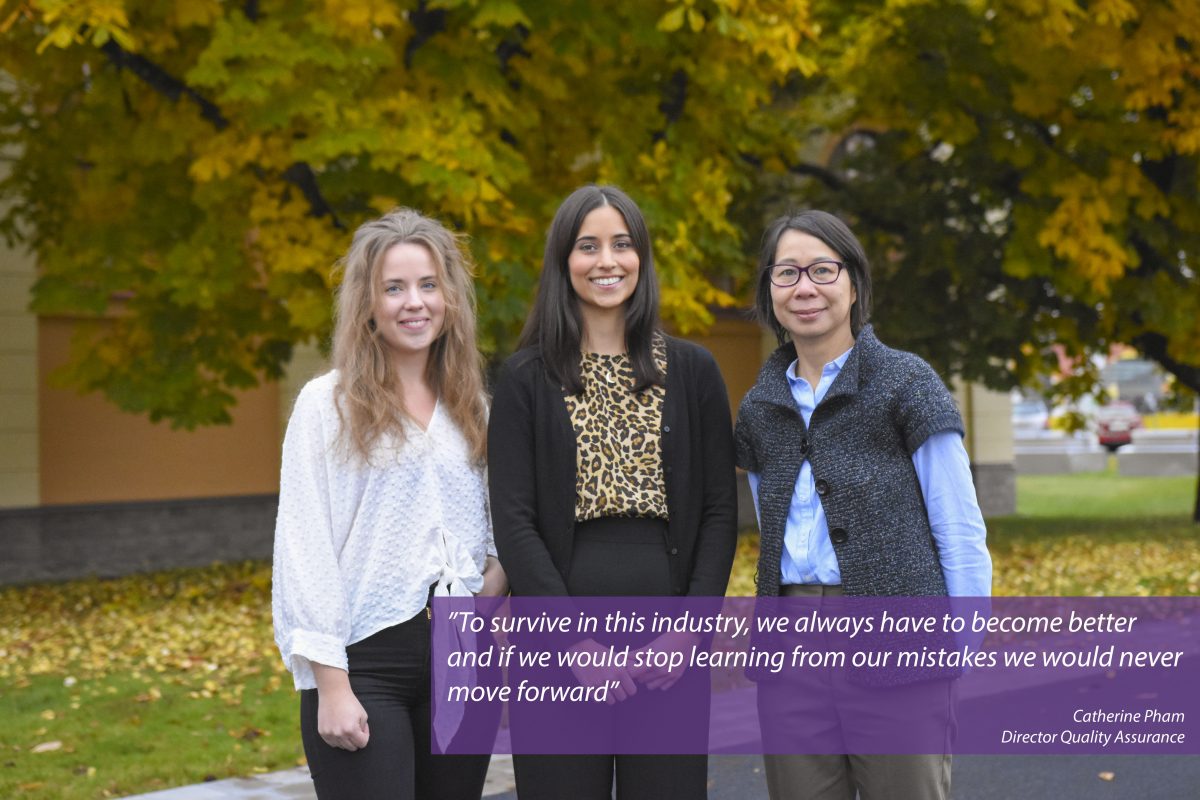
Quality Assurance, the core of a successful organisation
The QA department at CTC consists of employees with different front edge competences. Common to them all is their focus on accuracy and attentiveness to ensure a high overall quality of CTCs deliverables.
Organisationally, the quality assurance (QA) department is placed as a single unit in the holding company Center for Translational Research (CTR), side by side with CTC Clinical Trial Consultants and RegSmart which enables independent quality control of CTC. For other customers, the QA department offers e.g. 1 to 2 year’s subscription services with continuous quality support, development and maintenance of quality management systems (QMSs), newsletters, quality advice and audits.
“To me, it’s important to have a close collaboration on a regularly basis to perform high-quality work in the best way possible, preferably with small, local businesses”, says Catherine Pham, Director QA at CTC.
Catherine Pham has a broad experience within GCP, GMP, GLP and medical device both from CROs in Sweden and Japan as well as biotech-companies in Canada. Furthermore, she has been working as a QA Auditor within research and development (R&D). She has been developing QMSs for CE marking of medical device software, worked as regulatory advisor and has been involved in several ATMP studies from a QA perspective. She is a pharmacist by training and holds a Ph.D. in medical chemistry.
“My whole life is QA”, she explains and refers to the just over 20 years she has been spending on quality work.
Catherine Pham has overall quality responsibility for the operational activities at CTC and has developed CTC’s QMS.
“We can all make mistakes, but we can absolutely not make the same mistake again. We should always strive for improvement and continuous learning. We have to adapt to changes in laws, regulations and guidelines and optimise our processes thereafter. To survive in this industry, we always have to become better and if we would stop learning from our mistakes we would never move forward”, Catherine Pham explains.
At customer audits and during inspections from authorities, it’s Catherine Pham who’s the coordinator. She is also responsible for a risk-based internal audit program covering all CTC’s departments.
“Everyone knows about the applicable guidelines but those could be interpreted in different ways. I transfer guidelines into practice. Some interpretations you might need to argue for and in those cases thorough documentation is crucial.”
Sofia Nyberg, QA Auditor, works with GCP. She holds a degree in biomedical science and has been working as a Study Assistant Nurse at CTC’s clinical research units, which is of great help when it comes to interpretation of guidelines and regulations that are important for the conduct of a clinical trial. Besides performing internal audits of CTC’s clinical research units, Sofia is responsible for the administration of CTC’s standard operations procedures (SOPs) and templates, ensuring that they meet up to the regulatory requirements.
“I’m available for our staff whenever they need quality related support.”
Jasmin Faroque, QA Auditor, has her focus on GLP. She is a civil engineer, specialised in pharmaceutical chemistry and has experience from working with quality control at several pharmaceutical companies. Besides the GLP services she performs, she is also responsible for the handling and documentation of issue reporting at CTC.
“For matters like issue reporting, we need someone who is very precise and independent”, Catherine Pham emphasises and refers to Jasmin Faroque.
Working with QA, it’s important to be neutral, to build relationships without picking side and to be attentive and observant.
“We are detail-oriented but always keep a holistic view to be able to make rational decisions. We need to see potential risks at an early stage to avoid potential future problems”, Sofia Nyberg explains.
“It’s also important to be nice without taking up too much space”, Catherine Pham adds.
Since CTC is a relatively small company with approximately 60 co-workers, the decision-making routes are short and the work assignments varying.
“It’s very positive for your personal development to have several responsibility areas and a possibility to actually contribute to change”, says Jasmin Faroque.
For the QA department to operate optimally, it’s important to build trust in relation to CTCs staff and management.
“To me, quality is all about trust. I know which quality expectations CTC’s customers have and it’s important for me that everyone can rely on CTC as a CRO that delivers on that level in all projects”, says Catherine Pham.
